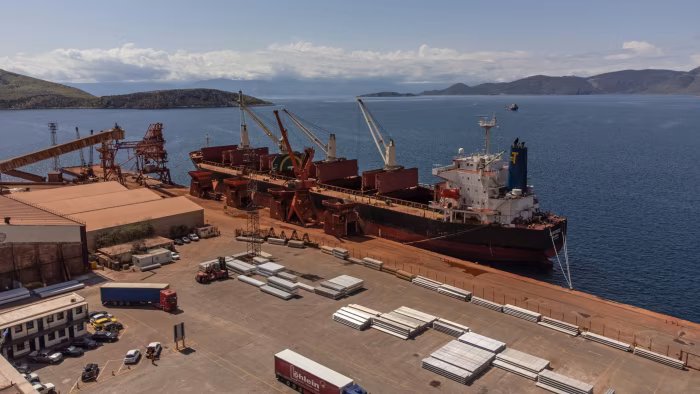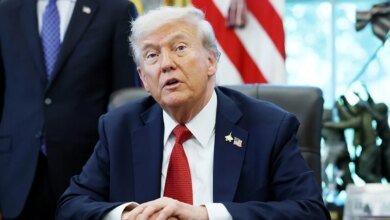US accused of ‘bully-boy’ tactics to sink climate deal

People attending the talks said Trump administration officials warned of additional trade tariffs and made personal threats against negotiators from other countries to prevent a landmark climate agreement for shipping.
The United States tore up the rules of normal global diplomacy and used “bully boy tactics” to derail a UN-backed net-zero framework for global shipping at meetings in London last month, more than a dozen diplomats, officials from other governments and industry observers told the Financial Times.
A group of US officials intimidated African countries and small islands in the Pacific and Caribbean into dropping their support for the framework, which would have imposed a tax on carbon emissions on maritime transport, according to people who attended the talks at the headquarters of the UN International Maritime Organization in London. The American group includes eight people, according to one of those present.
The intimidation included calling state officials during coffee breaks to warn them that they may not be able to transit through the United States, or that they and their families may face restrictions on entering the country if they act against American interests, according to five people in the conversations, including two from the countries directly threatened.
US President Donald Trump described the framework as a “new green global fraud tax on shipping” and called in a social media post last month for its ban.
The framework was provisionally approved by a majority of countries in April and was expected to become legally binding last month, but further discussions on its adoption have been postponed for a year.
While the Trump administration has made no secret of its disdain for the United Nations and multilateral organizations, diplomats and experts have warned that behavior at the IMO has gone too far, with potential long-term consequences for global governance.
“It was like a New York street,” said a diplomat from a country threatened with visa restrictions for shipping crews and other sanctions, including increased access fees at US ports, if it does not drop its support for the framework.
The diplomat said: “They went from delegation to delegation… and threatened them. They asked them to go back and talk to their capitals, and warn them about what would happen if they did not change their minds.”
Another veteran of IMO meetings said US tactics had left the entire organization – normally a forum for technocratic discussion and consensus-based decision-making – in “complete shock.”
“It’s like dealing with the mob,” the veteran added. “It’s bully boy tactics. They don’t need to tell you exactly what they’re going to do to you, just make it clear that there will be consequences.”
A State Department official did not address the personal threats made to delegates from other countries. But the official praised Greece and Cyprus, which broke away from the rest of the EU and abstained from voting to postpone the talks for a year, having previously agreed to the framework in April.
In a statement issued before the meetings in London, US Secretary of State Marco Rubio said the Trump administration was “evaluating sanctions on officials who sponsor activist-led climate policies that would burden American consumers, among other measures under consideration.”
Deviating from diplomatic tradition and using influence to force other countries to comply with its approach to issues such as climate change carries long-term risks for US influence, said Creon Butler, head of global economics at Chatham House.
“This may work in the very short term, but in the medium term it increases the chances that non-US countries will conclude that they cannot work with the United States, and independently conclude agreements among themselves that simply work around the United States,” he said.
Several countries, including Brazil, warned at a meeting last month that “methods that should never be used between sovereign states” had been deployed to subvert the net zero framework, but without providing details.
People attending the IMO talks said US intimidation was directed at individuals and capitals, with several countries, including Bangladesh, Japan and Indonesia, receiving diplomatic accompaniments – formal diplomatic protests – warning of retaliation.
One effort seen by the Financial Times used diplomatic language to warn against “reciprocal measures” against countries that supported the net zero framework. These included imposing additional trade tariffs, increasing duties on their ships when they call at US ports, increasing disembarkation fees and threatening to revoke US visas for crew members.
“There was a mix of economic threats, which were replicated on the ground, as well as very personal threats at delegate level, including threats related to visas,” said one IMO delegate, who consulted with several countries about the threats they faced from the United States, but asked to remain anonymous because “there is a lot of fear of retaliation.”
Another country delegate said some negotiators were told they would face restrictions if they planned to return home via the United States.
“We have received some very specific threats,” the person said. “They are clearly thinking about tools that can be applied to each country.” “Everyone was surprised by how much [the] pressure.”
Another delegate said that before the meeting in London, the United States had contacted countries around the world, including rich nations, warning that “individual delegation members could be placed on the sanctions list,” with the expectation that they would face visa restrictions if they supported the framework.
They added that these threats were then repeated in London. “It was absolutely extraordinary. I had never heard of anything like this in the context of IMO negotiations. These people. It was extraordinary.” [being threatened] “They are just bureaucrats, they are government employees,” the person said.
Although the net zero agreement has been postponed for one year, delegates said that as long as Trump remains in the White House, it is difficult to see how the agreement could enter into force.
Talks on the technical parameters of the deal have continued since then, but many delegates acknowledged they were largely fruitless.
Additional reporting by Amy Williams in Washington
2025-11-02 13:00:00




